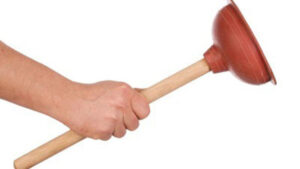Plumb vs Plum and Homemade Drain Cleaners
The word plumb is quite interesting. Originally, it meant a lead weight attached to the end of string to determine when something was truly straight. It also helped determine how straight and deep something could be.
Then there’s Prunus domestica which we know as the plum. One of history’s first domesticated fruits. While we think of dried plums as prunes, Prunus is the actual scientific name of the plum. Did they come to get their name from their dark color and high metallic mineral content of manganese and copper? Since plums were one of the first domesticated fruits, I wonder if they got their name from how they hang? Like a plumb bob.
So how does the word plumb correlate with a plumb-er? The Latin word for Lead is plumbum. In ancient times, it was used in making roofs, drains, conduits, pipes and baths. The term “plumber” could apply to anyone who worked with lead. Nowadays, lead is a no-no in pipes. Yet the term plumber remains.
So really, though you’re not working with lead, if you’re working on your pipes, drains or fixtures, you’re essentially a plumber!
 Homemade Drain Cleaners
Homemade Drain Cleaners
The first step when you need to clear your drains is to manually get any hair or other material out of the drain area. You can use a specially made hook they sell at the hardware store or even a hanger that you set up so it will go down the drain and clean out whatever is in there.
The second step to is to clearing any clogged pipe or drain is to use a store bought drain cleaner. Whether it’s Drano or Liquid Plumr, you can find a number of chemical-based liquid products you can pour down your sink to help loosen and break-up hair clogs, grease and oil build-up, and food deposits. But, with those products there can be some issues to take note of:
- Chemicals can be damaging to your pipes, fixtures and finish.
- Most are quite toxic and fumes can be harmful to you, your family or pets.
- Once flushed through your septic system they can prove hazardous to the environment.
- Some are ineffective. The actual issue may be something else but now you have a tub full of hazardous fluid.
A better alternative would be a more natural homemade drain cleaner that is just as effective but not nearly has harmful.
Here’s one you can try:
Materials:
1-2 cups vinegar
2 cups of Baking Soda
1 Large Pot of Boiling Water
Drain all the water from the sink, bowl, or tub. Pour a cup of baking soda into the drain. Then, pour about half of the what boiling water down into the drain. The mix of baking soda and boiling water should start eating at the build-up in the pipes.
Next, pour 1 more cup of baking soda down the drain along with 1 cup of white vinegar. You should plug the drain right after pouring in the vinegar.
Once you start hearing bubbles and fizzing you’ll know somethings happening. When the bubbles and fizz stops–pour the rest of the boiling water in.
Here’s another drain cleaner that uses bleach to clear the hair in a drain. Click here ->
Keep using this homemade drain cleaner as much as needed.
 What if liquid drain cleaners don’t work?
What if liquid drain cleaners don’t work?
The next option could be using a plunger to pull and push the clog. This often times can help move the clog along. But remember, a plunger is meant to bring the stuck stuff back up, not pushed down! You want to get out whatever is blocking the pipe.
It can also be fool’s gold. If you do push the material down further into the drain, the clog may move out of the way temporarily or partially break apart enough for water to pass.
What if a plunger doesn’t work on my clogged drain?
Another option is using a “snake”. A plumber’s snake is basically an auger with a flexible bit. Now these can be effective in drilling through and attaching to some clogs. Then reverse action of the auger would pull the clog out. Problem with snakes is the damage they can do to pipes if the pipes have cracks, rust, or are brittle. The bit can also do damage around the entry. But plungers can be very effective as a drain cleaner.
How can I prevent a clogged drain and therefore avoid these drain cleaners?
Ultimately the best thing would be to avoid habits that cause clogs and engaging in routine maintenance that would help clogs from forming.
 These steps can included:
These steps can included:
- Use mesh screens in your sinks to catch food, hair and other objects.
- Use your garbage disposal less. Save food waste for more environmental use like a compost pile.
- Don’t think of your sink as a trash can. Much easier to replace garbage bags versus a bathroom sink.
- Pour boiling water and baking soda down your drains once a month.
Encouraging and educating your household on the importance of properly disposing of waste and actively taking these steps will lessen your chances for clogs greatly!
If you have a clogged drain that you want cleaned correctly and thoroughly call the professionals at Mitch Clemmon Plumbing!
Your very best drain cleaner!
(562) 242-3218
Plumb vs Plum and Homeade Drain Cleaners
Plumb vs Plum and Homemade Drain Cleaners
The word plumb is quite interesting. Originally, it meant a lead weight attached to the end of string to determine when something was truly straight. It also helped determine how straight and deep something could be.
Then there’s Prunus domestica which we know as the plum. One of history’s first domesticated fruits. While we think of dried plums as prunes, Prunus is the actual scientific name of the plum. Did they come to get their name from their dark color and high metallic mineral content of manganese and copper? Since plums were one of the first domesticated fruits, I wonder if they got their name from how they hang? Like a plumb bob.
So how does the word plumb correlate with a plumb-er? The Latin word for Lead is plumbum. In ancient times, it was used in making roofs, drains, conduits, pipes and baths. The term “plumber” could apply to anyone who worked with lead. Nowadays, lead is a no-no in pipes. Yet the term plumber remains.
So really, though you’re not working with lead, if you’re working on your pipes, drains or fixtures, you’re essentially a plumber!
 Homemade Drain Cleaners
Homemade Drain Cleaners
The first step when you need to clear your drains is to manually get any hair or other material out of the drain area. You can use a specially made hook they sell at the hardware store or even a hanger that you set up so it will go down the drain and clean out whatever is in there.
The second step to is to clearing any clogged pipe or drain is to use a store bought drain cleaner. Whether it’s Drano or Liquid Plumr, you can find a number of chemical-based liquid products you can pour down your sink to help loosen and break-up hair clogs, grease and oil build-up, and food deposits. But, with those products there can be some issues to take note of:
- Chemicals can be damaging to your pipes, fixtures and finish.
- Most are quite toxic and fumes can be harmful to you, your family or pets.
- Once flushed through your septic system they can prove hazardous to the environment.
- Some are ineffective. The actual issue may be something else but now you have a tub full of hazardous fluid.
A better alternative would be a more natural homemade drain cleaner that is just as effective but not nearly has harmful.
Here’s one you can try:
Materials:
1-2 cups vinegar
2 cups of Baking Soda
1 Large Pot of Boiling Water
Drain all the water from the sink, bowl, or tub. Pour a cup of baking soda into the drain. Then, pour about half of the what boiling water down into the drain. The mix of baking soda and boiling water should start eating at the build-up in the pipes.
Next, pour 1 more cup of baking soda down the drain along with 1 cup of white vinegar. You should plug the drain right after pouring in the vinegar.
Once you start hearing bubbles and fizzing you’ll know somethings happening. When the bubbles and fizz stops–pour the rest of the boiling water in.
Here’s another drain cleaner that uses bleach to clear the hair in a drain. Click here ->
Keep using this homemade drain cleaner as much as needed.
 What if liquid drain cleaners don’t work?
What if liquid drain cleaners don’t work?
The next option could be using a plunger to pull and push the clog. This often times can help move the clog along. But remember, a plunger is meant to bring the stuck stuff back up, not pushed down! You want to get out whatever is blocking the pipe.
It can also be fool’s gold. If you do push the material down further into the drain, the clog may move out of the way temporarily or partially break apart enough for water to pass.
What if a plunger doesn’t work on my clogged drain?
Another option is using a “snake”. A plumber’s snake is basically an auger with a flexible bit. Now these can be effective in drilling through and attaching to some clogs. Then reverse action of the auger would pull the clog out. Problem with snakes is the damage they can do to pipes if the pipes have cracks, rust, or are brittle. The bit can also do damage around the entry. But plungers can be very effective as a drain cleaner.
How can I prevent a clogged drain and therefore avoid these drain cleaners?
Ultimately the best thing would be to avoid habits that cause clogs and engaging in routine maintenance that would help clogs from forming.
 These steps can included:
These steps can included:
- Use mesh screens in your sinks to catch food, hair and other objects.
- Use your garbage disposal less. Save food waste for more environmental use like a compost pile.
- Don’t think of your sink as a trash can. Much easier to replace garbage bags versus a bathroom sink.
- Pour boiling water and baking soda down your drains once a month.
Encouraging and educating your household on the importance of properly disposing of waste and actively taking these steps will lessen your chances for clogs greatly!
If you have a clogged drain that you want cleaned correctly and thoroughly call the professionals at Mitch Clemmon Plumbing!
Your very best drain cleaner!
(562) 242-3218

